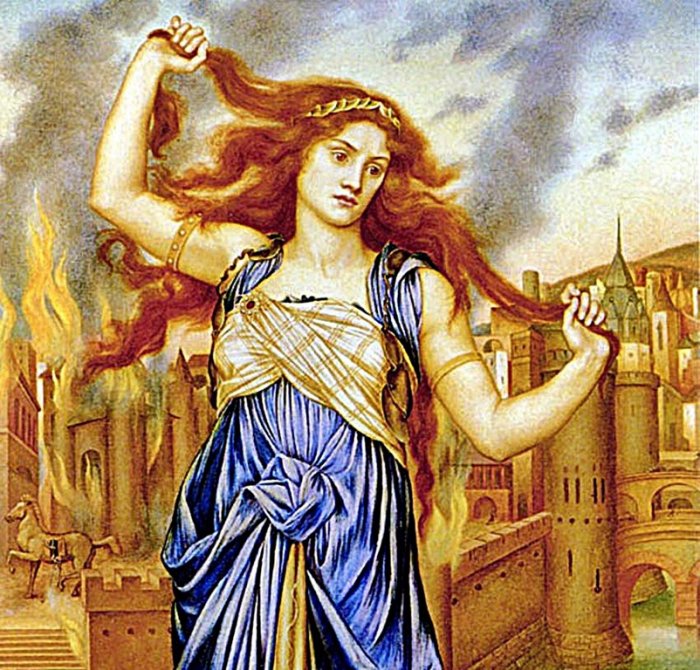Cassandra: Greek Goddess Who Foretold Cursed Prophecies
A. Sutherland - AncientPages.com - In Greek mythology, Cassandra was the daughter of King Priam and Queen Hecuba of Troy. She was the most beautiful of Priam's daughters and an inspired prophetess.
Pythia at Delphi, the Sibyls, and even an unfortunate Trojan princess, Cassandra, were regarded as 'brides of the god.'
Cassandra in front of city of Troy. Image credit: E. De Morgan (1898, London) - Public Domain
Apollo's love for Cassandra was so strong that he decided to give her the gift of prophecy, which she wanted to possess so much. With this power, Cassandra could foretell what would happen in the future. In return, he was promised to get her sexual favors, but Cassandra decided to refuse his advances.
She broke her promises, which made Apollo very angry. Unfortunately, he could not take back his gift because divine powers, once granted, might not be revoked. The only thing Apollo could do was make Cassandra's gift without account, so no one ever believed her.
It was god Apollo's only revenge for what she had done to him. Now, Cassandra was cursed by him, and so were her prophecies.
Even when Cassandra stands before the palace in Argos, foretelling her imminent death and that of Agamemnon, no one believes her. The chorus of elders claims they cannot or must not believe her. (Aeschylus' Agamemnon (1072-1330).
Homer's Iliad mentions or alludes to many Greek legends and myths. In the famous epic, Cassandra predicted many tragic events of the Trojan War, a legendary conflict between the early Greeks and the people of Troy in western Anatolia, dated by later Greek authors to the 12th or 13th century BC.
One is related to Priam's son Paris who planned a trip to Sparta. Cassandra warned against this trip, but her warnings were ignored. Each time she told the Trojans what would happen, they would never listen to her warnings.
 Woodcut illustration of Cassandra's prophecy of the fall of Troy (at left) and her death (at right), from an incunable German translation by Heinrich Steinhöwel of Giovanni Boccaccio's De mulieribus claris, printed by Johann Zainer (de) at Ulm ca. 1474. Image: kladcat - CC BY 2.0
Woodcut illustration of Cassandra's prophecy of the fall of Troy (at left) and her death (at right), from an incunable German translation by Heinrich Steinhöwel of Giovanni Boccaccio's De mulieribus claris, printed by Johann Zainer (de) at Ulm ca. 1474. Image: kladcat - CC BY 2.0
Paris traveled to Sparta, where he kidnapped Helen. In Greek mythology, Helen of Troy, also known as Helen of Sparta, was the daughter of Zeus. The abduction of Helen by Paris, Prince of Troy, started the Trojan War with Greece.
Another Cassandra's prediction was also a serious warning. The prophetess predicted Troy's defeat and warned the Trojans not to accept the Greek gift of the Trojan horse, but her prophecy was ignored. Greek troops hid inside the Trojan Horse, which suddenly appeared and captured the city of Troy.
After the Greek victory, Cassandra was given a prize by the Greek leader Agamemnon, the son of King Atreus and Queen Aerope of Mycenae. Later, she returned to Greece with him and their twin boys, Teledamus and Pelops.
However, she also had yet another prediction in her mind. She predicted a terrible fate awaited her and Agamemnon. And so it happened, when they reached Agamemnon's home in Mycenae, they were both killed by Agamemnon's wife, Clytemnestra, and her lover, Aegisthus. Also, their children were killed.
Cassandra was sent to the Elysian Fields after her death because her soul was judged worthy due to her dedication to the gods and her piety during her life.
Cassandra's burial place was believed to be located at Amyclae or Mycenae. The two towns disputed the possession of the prophetess' grave. Heinrich Schliemann, a German archaeologist, considered the modern discoverer of prehistoric Greece, was confident that he found Cassandra's tomb during his excavations at Mycenae. Schliemann found the remains of a woman and two infants in one of the circle's graves at the site.
Written by - A. Sutherland - AncientPages.com Senior Staff Writer
Updated on March 15, 2024
Copyright © AncientPages.com All rights reserved. This material may not be published, broadcast, rewritten or redistributed in whole or part without the express written permission of AncientPages.com
Expand for referencesMore From Ancient Pages
-
 New Path For Early Human Migrations Contradicts A Single ‘Out Of Africa’ Theory
Evolution | Oct 5, 2023
New Path For Early Human Migrations Contradicts A Single ‘Out Of Africa’ Theory
Evolution | Oct 5, 2023 -
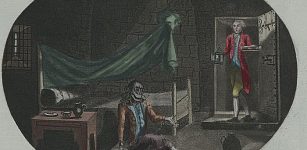 On This Day In History: “Man In The Iron Mask” Died In The Bastille, Paris, France – On Nov 19, 1703
News | Nov 19, 2016
On This Day In History: “Man In The Iron Mask” Died In The Bastille, Paris, France – On Nov 19, 1703
News | Nov 19, 2016 -
 Oldest Cyrillic Inscriptions Dated To The Time Of King Simeon the Great – Discovered
Archaeology | May 3, 2023
Oldest Cyrillic Inscriptions Dated To The Time Of King Simeon the Great – Discovered
Archaeology | May 3, 2023 -
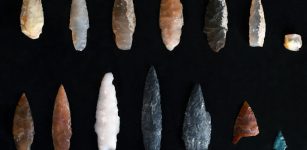 Oldest Known Projectile Points In The Americas Discovered In Idaho
Archaeology | Dec 23, 2022
Oldest Known Projectile Points In The Americas Discovered In Idaho
Archaeology | Dec 23, 2022 -
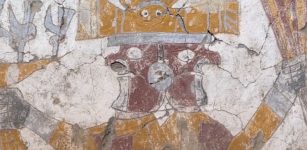 Ancient Murals Of Mysterious Two-Faced Beings And Supernatural Creatures At Pañamarca, Peru
Archaeology | Mar 21, 2023
Ancient Murals Of Mysterious Two-Faced Beings And Supernatural Creatures At Pañamarca, Peru
Archaeology | Mar 21, 2023 -
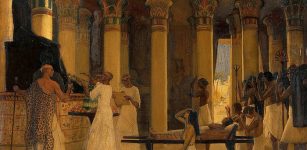 Egyptians Mastered Medicine Thousands Of Years Ago
Civilizations | Oct 1, 2015
Egyptians Mastered Medicine Thousands Of Years Ago
Civilizations | Oct 1, 2015 -
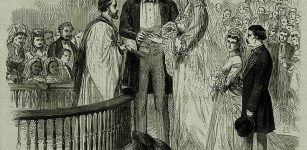 On This Day In History: One Of The Tallest Women In History – Died – On August 5, 1888
News | Aug 5, 2016
On This Day In History: One Of The Tallest Women In History – Died – On August 5, 1888
News | Aug 5, 2016 -
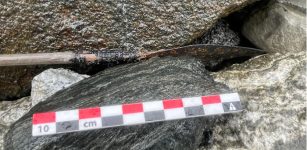 Arrow Pre-Dating The Vikings Discovered After Being Lost In The Ice For 1,500 Years
Archaeology | Aug 25, 2022
Arrow Pre-Dating The Vikings Discovered After Being Lost In The Ice For 1,500 Years
Archaeology | Aug 25, 2022 -
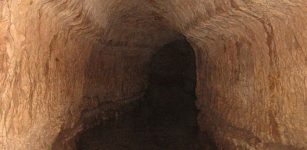 Qanat Firaun -‘Canal Of The Pharaohs’ Is The Ancient World’s Longest Underground Tunnel
Featured Stories | Mar 10, 2022
Qanat Firaun -‘Canal Of The Pharaohs’ Is The Ancient World’s Longest Underground Tunnel
Featured Stories | Mar 10, 2022 -
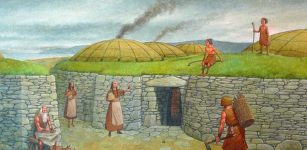 Obscure History Of Skara Brae – Home To Dwarfs
Civilizations | Apr 12, 2017
Obscure History Of Skara Brae – Home To Dwarfs
Civilizations | Apr 12, 2017 -
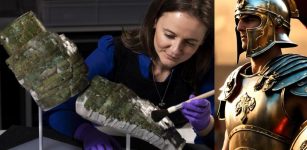 Extremely Unique Ancient Roman Arm Guard Found At Trimontium Fort – Restored And On Display For The First Time Ever
Archaeology | Jan 22, 2024
Extremely Unique Ancient Roman Arm Guard Found At Trimontium Fort – Restored And On Display For The First Time Ever
Archaeology | Jan 22, 2024 -
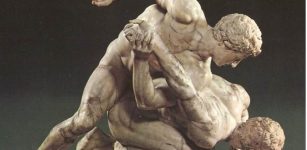 What Was The True Meaning Of Pankration And Other Ancient Games
Archaeology | Sep 11, 2021
What Was The True Meaning Of Pankration And Other Ancient Games
Archaeology | Sep 11, 2021 -
 On This Day In History: Tokugawa Shogunate Begins In Japan After Historical Battle – On Oct 21, 1600
News | Oct 21, 2016
On This Day In History: Tokugawa Shogunate Begins In Japan After Historical Battle – On Oct 21, 1600
News | Oct 21, 2016 -
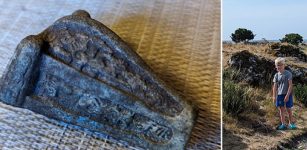 8-Year-Old Boy Finds Unusual Viking Age Artifact On Gotland Island, Sweden
Archaeology | Sep 18, 2023
8-Year-Old Boy Finds Unusual Viking Age Artifact On Gotland Island, Sweden
Archaeology | Sep 18, 2023 -
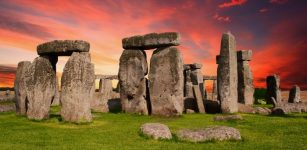 Stonehenge Is Older Than Mankind – Archaeologist Suggests
Archaeology | Apr 12, 2018
Stonehenge Is Older Than Mankind – Archaeologist Suggests
Archaeology | Apr 12, 2018 -
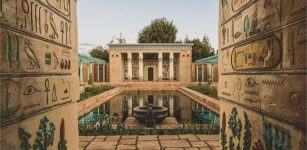 World’s First Recreated Ancient Egyptian Garden Is Now Open To The Public
News | May 17, 2022
World’s First Recreated Ancient Egyptian Garden Is Now Open To The Public
News | May 17, 2022 -
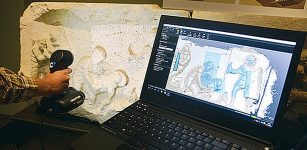 Archaeologists Use Laser Technology To Create Digital Models Of Ancient Artifacts
Archaeology | Jan 28, 2016
Archaeologists Use Laser Technology To Create Digital Models Of Ancient Artifacts
Archaeology | Jan 28, 2016 -
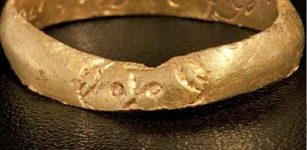 Skulls and inscriptions on three rings found by archaeologists in Wales
Artifacts | Aug 29, 2015
Skulls and inscriptions on three rings found by archaeologists in Wales
Artifacts | Aug 29, 2015 -
 The Name Vatican And Etruscan Goddess Vatika Of The Underworld – What Is The Connection?
Featured Stories | Jun 6, 2020
The Name Vatican And Etruscan Goddess Vatika Of The Underworld – What Is The Connection?
Featured Stories | Jun 6, 2020 -
 Kallikantzaroi: Naughty Nocturnal Goblins Emerge From Underground Only During Twelve Days Of Christmas
Christmas Traditions | Dec 17, 2019
Kallikantzaroi: Naughty Nocturnal Goblins Emerge From Underground Only During Twelve Days Of Christmas
Christmas Traditions | Dec 17, 2019

